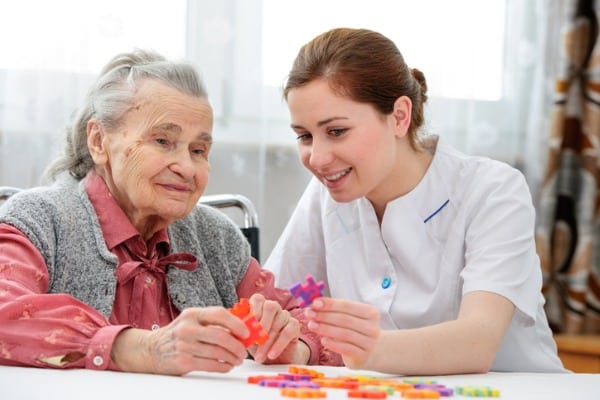You may have heard of Five Ways to Wellbeing. Developed by the New Economics Foundation, it is a guide to actions we can all take to improve our physical and mental wellbeing. The five areas being: Connect, keep Learning, be Active, take Notice and Give. CLANG! It’s a great initiative, but can it be adapted for people living with dementia and how can we support them with this?
Connect: When someone with dementia leaves their safe and familiar home environment to live in a care home it can be frightening, confusing and unfriendly. As carers we can help them to connect to their environment by making sure it is familiar, easy to navigate and fun to explore. We can make sure that it is comfortable and homely with appropriate lighting and noise levels.
We can support people with dementia to connect to others by facilitating better communication. Minimising distractions, making sure hearing aids are worn and working properly and paying attention to non-verbal communication. We can facilitate interaction using other methods of communication like music and touch. We can support families and friends by encouraging the use of quieter areas and gardens when they visit.
We can support them to connect to themselves by encouraging familiar routines that build confidence. We can facilitate self-expression through music and creative activities and use reminiscence to help them connect to their past.
Learning: Although memory loss and cognitive decline make it difficult for someone with dementia to learn new things, we can help someone rediscover old interests and skills, one step at a time, to maximise the chance of success. We can encourage people to explore different textures, tastes and visual experiences. Although it may seem the benefits are short lived, the feelings of contentment and satisfaction associated with activities may remain much longer.
Active: Being active reduces stress, increases energy levels, improves balance and co-ordination, makes us more alert and helps us to sleep better. These benefits are more important than ever for people living with dementia, who may also have age-related conditions such as arthritis and vascular problems. We can support them to overcome the psychological barriers such as lack of confidence and fear of falling. Introduce regular meaningful activities and make them fun to increase the chances of participation.
Notice: Improving awareness of the environment can help those with dementia to make choices, connect with reality and reorient to their surroundings. This in turn can reduce confusion, reduce stress and promote feelings of pleasure and contentment. We can encourage curiosity. Point out new flowers coming into bloom, remark on the feel of the wind and the changing seasons and encourage appreciation of the smell, taste and texture of food.
Give: Everyone likes to feel useful and valued. Giving something back increases feelings of belonging. Those with dementia whose cognitive and functional abilities are declining can feel less and less useful, leading to withdrawal, social isolation and lack of confidence. We can help them to feel valued and useful by encouraging participation in meaningful activities. Acknowledging and accepting what someone else gives is good for them as well as you. Acknowledge a smile and give them one back. Accept a compliment. Accept an offer to help even if it means your job will take a little longer.
By encouraging and facilitating these five ways to wellbeing, we can provide opportunities for people living with dementia to use their strengths and live well with improved levels of functioning, enjoying positive relationships and a greater sense of wellbeing.






